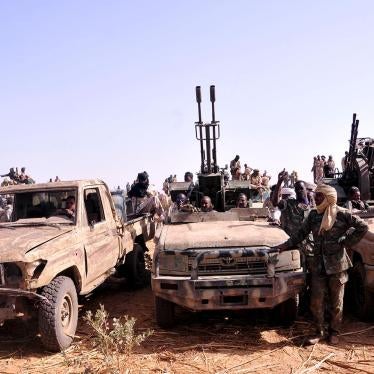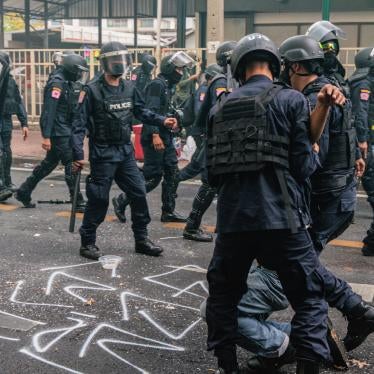A number of recent events involving the media in Albania highlight the importance of securing freedom of the press and freedom of expression in the country. As a signatory of the International Covenant on Civil and Political Rights, the new government is obligated to ensure that Albanian law and the government's human rights practices conform with international standards. Addressing the following issues would demonstrate a willingness to respect Albania's legal obligations and mark a departure from the human rights record of the previous government.
Human Rights Watch/Helsinki is strictly non-partisan and does not favor any political force in Albania or any other country. Our sole aim is to secure guarantees that the Albanian government, regardless of who is in power, respects its obligations under international law.
Shooting of Mujo Buçpapaj
On August 21, around 6:20 p.m., Mujo Bucçpapaj, a journalist with Rilindja Demokratike (the official newspaper of the opposition Democratic Party) was shot and seriously wounded while walking in Tirana with his wife and young child. According to the Buçpapaj family and a Democratic Party press statement, individuals from a police car fired at Mr. Buçpapaj, striking him in the leg. The Democratic Party believes that the attack was politically motivated. Police, however, maintain that Buçpapaj was either caught in crossfire or hit by a ricocheting bullet during a gun battle between two armed gangs.
It is unclear whether Mr. Buçpapaj was indeed targeted or the unlucky victim of street violence. Because providing for the physical protection of journalists is critical for the protection of freedom of expression, Human Rights Watch/Helsinki urges the authorities to conduct a full and impartial investigation of the attack, make public the results, and hold accountable all those found responsible.
Freedom of Expression in Television and Radio
On August 19, the former speaker of parliament and current MP Pjeter Arbnori began a hunger strike to protest what he considers biased reporting against the Democratic Party on the state television. His action received coverage on state television's news, as have other Democratic Party complaints about media coverage. Under the new government, the state television and radio have generally provided more balanced reporting; nevertheless, Mr. Arbnori's strike underscores the importance of respecting and promoting freedom of expression in the broadcast media.
Although a number of private television and radio stations now exist, their legal status remains unclear. Specifically, there is no clear procedure for obtaining a broadcast licence, which opens the door for the arbitrary denial of licences on political grounds. To ensure that a wide spectrum of views are represented in the media, the government should establish a broadcast regulatory authority that is independent of the executive branch or government. Such an agency should design licensing procedures and regulatory mechanisms that ensure non-discrimination in the awarding of licences and access to the airwaves for a diversity of information and views, including news and political opinions.
Although it is not obligated to do so under international law, the government might also consider reform of state television and radio to ensure its political independence and objectivity. According to the Statutes for the Albanian Radio and Television, Article 3, "The Albanian radio and television is a depoliticized institution where the activities of political parties are forbidden." Only lasting structural changes will guarantee that the state media do not become a political tool once again.
The Press Law
The new government should work to repeal or amend the press law, which the previous government adopted and used to imprison or fine journalists who expressed criticism of the state. The law states that the press is free but includes provisions that restrict access to information that is deemed a state secret, goes against the public good or would affect a court case in process. In the past, such vague terminology allowed the government to arbitrarily withhold information. According to Articles 21 and 22, violators of the law may be fined up to U.S. $8,000. Such an amount is grossly disproportionate to the income of an average journalist and would place an extraordinary financial burden on any Albanian publication, perhaps forcing it to close.
Distribution of Newspapers
For the past few months, Rilindja Demokratike and Albania, a newspaper closely tied to the Democratic Party, have complained that their delivery vans are not able to travel to the south of the country. Human Rights Watch/Helsinki has not been able to confirm the allegation but believes that the government should investigate and take the appropriate steps to ensure that all printed media, regardless of its political content, is able to distribute unhindered. If individuals are blocking the newspapers, the government should take the necessary action to let the vans through.








